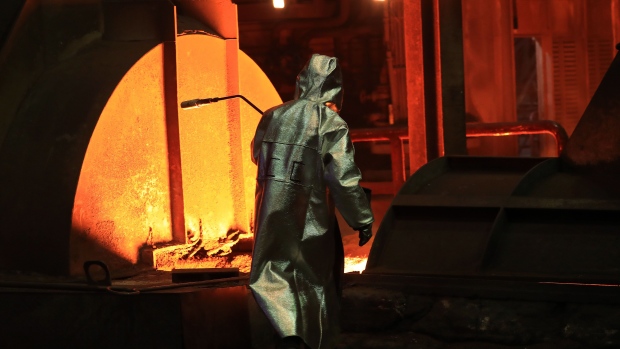Nov 22, 2023
Thyssenkrupp Writes Down Steel Unit Again as Energy Crisis Bites
, Bloomberg News

(Bloomberg) -- Thyssenkrupp AG gained after the wrote down the value of its struggling steel business by a further €1.8 billion ($1.96 billion), boosting chances the company will finally succeed in offloading some of the business.
The German industrial conglomerate has for years looked to spin off or sell its loss-making steel business, and talks to sell half of the unit to Czech billionaire Daniel Kretinsky have hit some hurdles. The company on Wednesday said negotiations had been constructive with a potential joint venture in focus.
The shares rose as much as 7.5% in Frankfurt trading, the most since May. The stock has gained 23% since the start of the year.
Thyssenkrupp’s steel unit has repeatedly failed to break even due to high investment requirements and low steel prices, weighing on the company’s overall earnings. High energy prices stemming from Russia’s invasion of Ukraine and rising interest rates have also increased costs for the division, which was the subject of a €350 million writedown earlier this year before Wednesday’s additional €1.8 billion.
“We are continuing to work consistently on improving the performance of all our businesses,” Chief Financial Officer Klaus Keysberg said in a statement. “This will create the conditions for achieving our medium-term goals, even in a challenging environment.”
The company reported a €1.98 billion net loss for its financial year ended Sept. 30, even as free cash flow before mergers and acquisitions turned positive to €363 million compared with the prior year. Thyssenkrupp said it expects earnings to improve to a figure in the high-three-digit million euro range as performance improvement plans yield results.
Once synonymous with German industrial prowess, Thyssenkrupp is undergoing a restructuring after several challenging years. Miguel Ángel López Borrego took over as chief executive officer in June after his predecessor, Martina Merz, left amid criticism of slow progress in her effort to transform the company.
Thyssenkrupp reaffirmed mid-term targets, saying it would continue to strive to achieve an adjusted EBIT margin of 4% to 6% at group level, a significantly positive value for free cash flow before M&A and reliable dividend payments. The company proposed a dividend payment of 0.15 cents per share, the same as in the previous year.
©2023 Bloomberg L.P.





